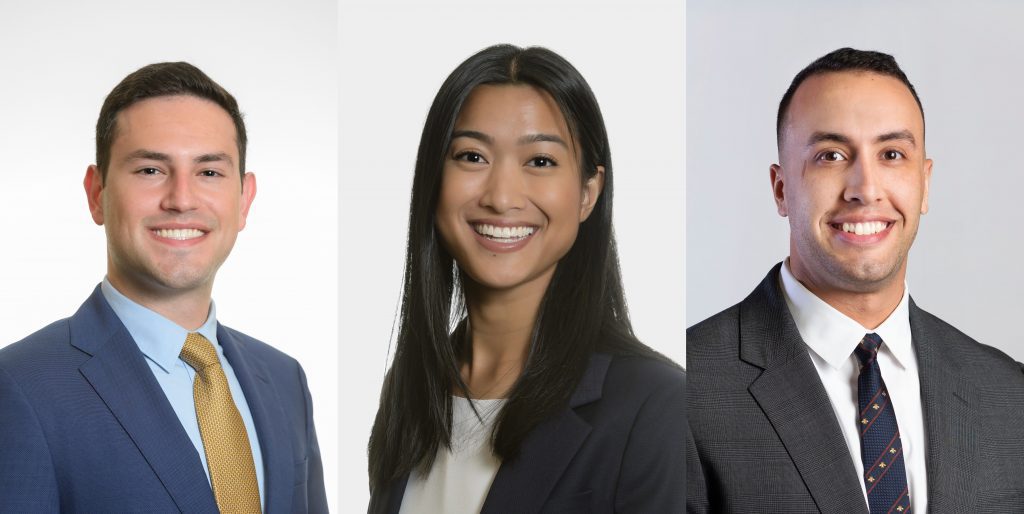- College of Medicine Communique Research Students

Two UCF medical students are spending this year conducting research at the National Institutes of Health – focusing to find ways to better treat resistant ovarian cancer and use AI to diagnose prostate cancer sooner. Third-year UCF medical student Dennis Gross completed the program last year and inspired his colleagues to pursue the NIH research experience.
David Gelikman and Kristen Ibanez were selected for the NIH’s highly competitive Medical Research Scholars Program (MRSP). The yearlong research program accepts about 50 creative, research-oriented medical students each year to conduct mentored research at the NIH in Bethesda, MD or its satellite campuses. This program provides an opportunity for participants to immerse themselves in medical research, gaining invaluable experience to support their future medical career.
Gelikman, a third-year medical student with an interest in pursuing a residency in urology, is conducting research alongside Dr. Baris Turkbey, one of the foremost experts in prostate cancer imaging. David is researching ways to use AI to detect genitourinary cancers.
“The interdisciplinary collaboration here is thrilling,” he said. “It’s a melting pot of ideas and expertise, which is essential for groundbreaking research.”
In his first three months in the MRSP, David authored a review article on AI-powered radiomics applied to urologic malignancies, published in Current Opinion in Urology with additional manuscripts under review. He will be presenting his research at the Society of Urologic Oncology and Genitourinary American Society of Clinical Oncology conferences.
Gelikman says the program expands beyond research to include journal clubs, clinical teaching rounds and a seminar series with distinguished senior investigators and early-mid career clinician-scientists.
“Working at the NIH has expanded my perspective on what can be achieved in academic medicine,” Gelikman said, “I can’t think of anything more exciting than becoming a physician-scientist.”
Ibanez is working on improving therapies for gynecological cancers under the guidance of Dr. Jung-Min Lee. Before being selected for the MRSP, Kristen had conducted multiple research projects, including her FIRE (Focused Inquiry and Research Experience) study on pain and sensitivity for those suffering from diabetic neuropathy that earned top honors. FIRE is a mandatory two-year research project that every UCF medical student completes to create new scientific knowledge and build within them a spirit of inquiry. She believes the experience at the NIH is a way to build on her research skills and gain further research experience.
At the NIH, Ibanez’s focus on ovarian cancer has allowed her to participate in complex research in one of the most challenging areas of women’s health. “Dr. Lee combines translational research and clinical trials together and plans each study thoughtfully and carefully to back up why exactly these clinical trials are important,” she said.
Her schedule is split between observing the care of patients undergoing clinical trials and conducting experiments and analyzing data in Dr. Lee’s lab. She highly values the opportunity to work with the NIH patient population, especially those who have exhausted all standard treatment options.
“The women that come to the NIH are usually patients who have already been through multiple therapies without success” she shared. “Seeing patients respond to novel treatments is not just exciting for us as researchers but also incredibly hopeful for the patients who previously thought they had no options left.”
As an MRSP Scholar, Gross worked in basic science and translational research projects with two different mentors and their laboratories. Gross researched pulmonary hypertension in Dr. Mike Solomon’s lab, evaluating the role of cell-free mitochondrial DNA as a promising biomarker for disease. In addition, his work with Dr. Elizabeth Murphy examining how a mitochondrial protein affects exercise capacity earned him a peer-reviewed publication in the Journal of Physiology. During his year, he attended professional meetings and presented an abstract at a national conference. He encourages anyone interested in research to apply to programs and fellowships – for both the scientific and life experience.
“Everything in research at that level is something that no one has done before,” he said. “Even working with these prestigious mentors, there’s no template. They are figuring things out step-by-step and we are working together to solve it on our own which is the coolest part.”
Post Tags
- Research students